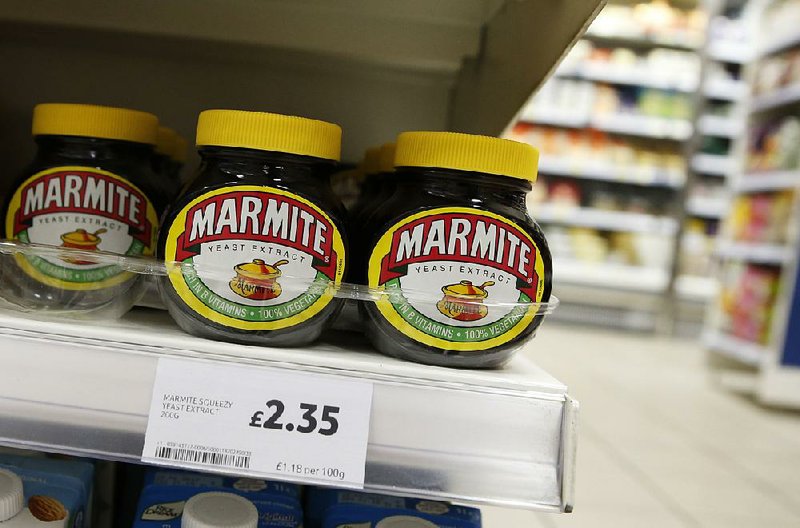LONDON -- Philip Walker spreads Marmite on his daily crumpet and stockpiles jars of the yeast spread. He's a fan, and he's upset at plans to raise the price.
Marmite has become the most visible sign yet of Britain's decision to leave the European Union after consumer giant Unilever sought to raise wholesale prices for its products by a reported 10 percent after a sharp drop in the value of the pound.
Tesco, the U.K.'s biggest supermarket chain, has rejected the increase and removed many Unilever products from its website.
"I am more angry at Unilever than I am at Tesco," said Walker. "It seems Unilever is using Brexit as an excuse to hold Tesco customers to ransom."
Britons voted June 23 to exit the EU after a bitter campaign in which opponents promised economic mayhem if the country chose to leave the 28-nation bloc. For the general consumer, the consequences of that decision are only now becoming apparent.
The pound is down more than 18 percent against the dollar and almost as much against the euro since June. While for weeks the effect had been felt mainly by Britons spending abroad, the currency's plunge is becoming a reality as the cost of imported goods rises.
Unilever, which makes Dove soap, Ben & Jerry's and Magnum ice cream, and Persil laundry powder, is the first company whose efforts to pass these costs on to its customers have become public.
"This is the first warning sign of there being a real change," said Patrick O'Brien, content director at Verdict Retail. He predicts a future with many spirited negotiations between retailers and suppliers. "Someone has to pay."
Changes are evident in the supermarket business, where chains compete to offer the lowest prices. Mainstream retailers such as Tesco and Sainsbury's are struggling to fend off discounters including Lidl and Aldi.
The EU exit vote has thrown a "huge wobble" into the equation, said Christopher Haskins, who built Northern Foods into a major supermarket supplier.
"Undoubtedly what Unilever is doing is justified in terms of the economics of it, but Tesco's worried that Aldi may not follow suit," Haskins, who now sits in the House of Lords, told the BBC.
Shoppers searching Tesco's website Thursday for Unilever products were greeted with the same message: "Sorry, this product is currently not available."
But it was Marmite, a distinctly British product, that seized the public imagination. The spread, made from concentrated brewer's yeast, was first produced in Burton-on-Trent, England, in 1902. Unilever acquired the brand in 2000.
People could grasp the idea that this breakfast staple might become very expensive. In a discussion that has centered on national growth rates, inflation and currency fluctuations, Marmite could be understood by all.
The matter even rose to the attention of Parliament. Pete Wishart, the Scottish National Party's leader in the House of Commons said, "Who would have thought that the first casualty of this hard Brexit would be the nation's supplies of Marmite?"
Business on 10/14/2016
